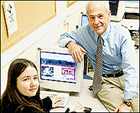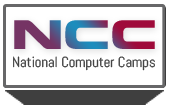 Fairfield University professor Michael Zabinski created the computer camp. Michelle Woodruff, who wasn’t born when the first camp was held, is a camp instructor. Chris Volpe/Register
Fairfield University professor Michael Zabinski created the computer camp. Michelle Woodruff, who wasn’t born when the first camp was held, is a camp instructor. Chris Volpe/RegisterMichael Zabinski denies he can predict the future, but he does have amazing foresight.
This was three years before the introduction of the first widely-available, consumer-friendly personal computer. At the time, Zabinski was promoting something called a “computer camp.” Kids would get together and play with, take apart and write programs for these newfangled contraptions.
His National Computer Camps, the first of its kind in the nation, would go a long way toward making Zabinski’s prediction come true.
Zabinski, an Orange resident and professor of physics and engineering at Fairfield University, paired children with bits, bytes and mainframes long before the rest of the world learned that computers and kids are a perfect match.
The camp ran at Amity Junior High School in Orange, where Zabinski blended lectures and hands-on computer education, with (of course) computer games.
Now, having held the summer camps in cities across the country, Zabinksi would likely need a computer program to say how many children have passed through the program.
“It’s thousands and thousands,” said Zabinski, who counts his own two children, now grown, among the campers. The camps will be held in four states this summer, including from June 23 through Aug. 2 at Sacred Heart University. With its competitive rates of $740 a week for campers who stay overnight, the sessions draw children from across the country, as well from local communities, Zabinski said.
Across New England, other types of summer camps are more popular “by a huge margin,” said Bette Bussel, executive director of the American Camping Association of New England. However, she said, computer camps provide a crucial niche for children with specific interests.
“Many of the specialty camps fit the bill for certain types of children,” she said. “You have to have the right match.”
Bussel also said the trend in computer camps is for large companies to open many sites across the country.
For Zabinski, who is president of National Computer Camps, limiting the number of his camp sites to 4-6 each summer keeps the business manageable, and the experience educational.
“I am an educator, first and foremost” he said.
The business is going strong despite the failure of other computer camp programs. American Computer Experience, a Georgia-based company, for instance, went out of business last year.
The key to the success of his camps, Zabinski says, is “delivering exactly what we say we will do.” While Zabinski employs a trained staff of counselors, he is in on every aspect of camp.
“We know what excites kids are far as learning goes” said Zabinski, who once wrote a series of books on computers, including “Computers For Kids from 8 to 80.” “We can do things in the summer that you can’t do during the year because of curriculum restraints.”
Mary Lee Barker of Woodbridge has sent her two boys, Daniel and Nathan Perlman, to Zabinski’s camp for about six years, because the camp creates “an ideal setting,” she said. The camps cater to kids at every level of experience, and are very focused on learning.
“Some kids go to sports camp, my kids go to computer camp,” she said. “It’s an opportunity for them to be in a very well supervised setting, doing something they love.”
The camp curriculum includes five hours a day of instruction, with options for even more time on computers or afternoon sports. Campers are paired to offer children a chance to exchange ideas, and extensive programming instruction is part of the core program. Game writing, a must-have for some children, also is offered.
“Lots of kids wake up and say ‘I want to write my own game,’ ” Zabinski said.
All the computers used in the camp are fast, up to date and contain a lot of memory, because those are the elements children expect, Zabinski said. The technology is light years ahead of the slower, clunky machines that were around in 1978.
While computers — and their ubiquitous nature — have changed in 25 years, children in many ways have not, he said.
“They were just as curious and motivated then as they are today,” he said.
The typical camper, Zabinski said, “is totally excited, totally involved and totally wrapped up in computers.” For those kinds of kids, the camp also offer a chance to socialize and make friends with like-minded children, he said.
Zabinski keeps his student to staff ratio at 8:1 or lower, typically employing 10-12 counselors per site. Because he is cautious about hiring, most of his counselors are former campers.
Daniel Perlman, 13, an eighth grader at Amity Junior High Bethany, said he enjoys working with other youths interested in computers, especially with so much help available from counselors. Another key element, he said, is that the camp provides a network that allows numerous campers to play games together simultaneously.
“Most of the people who go play network games,” he said.
©New Haven Register 2002
